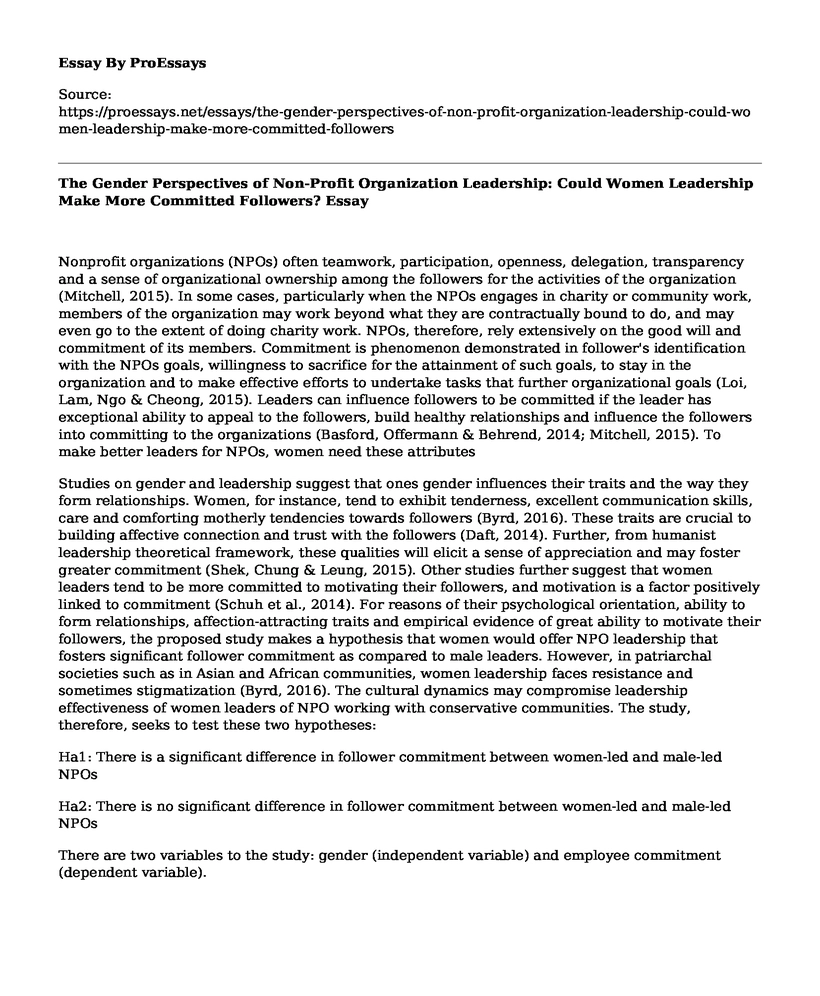Nonprofit organizations (NPOs) often teamwork, participation, openness, delegation, transparency and a sense of organizational ownership among the followers for the activities of the organization (Mitchell, 2015). In some cases, particularly when the NPOs engages in charity or community work, members of the organization may work beyond what they are contractually bound to do, and may even go to the extent of doing charity work. NPOs, therefore, rely extensively on the good will and commitment of its members. Commitment is phenomenon demonstrated in follower's identification with the NPOs goals, willingness to sacrifice for the attainment of such goals, to stay in the organization and to make effective efforts to undertake tasks that further organizational goals (Loi, Lam, Ngo & Cheong, 2015). Leaders can influence followers to be committed if the leader has exceptional ability to appeal to the followers, build healthy relationships and influence the followers into committing to the organizations (Basford, Offermann & Behrend, 2014; Mitchell, 2015). To make better leaders for NPOs, women need these attributes
Studies on gender and leadership suggest that ones gender influences their traits and the way they form relationships. Women, for instance, tend to exhibit tenderness, excellent communication skills, care and comforting motherly tendencies towards followers (Byrd, 2016). These traits are crucial to building affective connection and trust with the followers (Daft, 2014). Further, from humanist leadership theoretical framework, these qualities will elicit a sense of appreciation and may foster greater commitment (Shek, Chung & Leung, 2015). Other studies further suggest that women leaders tend to be more committed to motivating their followers, and motivation is a factor positively linked to commitment (Schuh et al., 2014). For reasons of their psychological orientation, ability to form relationships, affection-attracting traits and empirical evidence of great ability to motivate their followers, the proposed study makes a hypothesis that women would offer NPO leadership that fosters significant follower commitment as compared to male leaders. However, in patriarchal societies such as in Asian and African communities, women leadership faces resistance and sometimes stigmatization (Byrd, 2016). The cultural dynamics may compromise leadership effectiveness of women leaders of NPO working with conservative communities. The study, therefore, seeks to test these two hypotheses:
Ha1: There is a significant difference in follower commitment between women-led and male-led NPOs
Ha2: There is no significant difference in follower commitment between women-led and male-led NPOs
There are two variables to the study: gender (independent variable) and employee commitment (dependent variable).
References
Basford, T. E., Offermann, L. R., & Behrend, T. S. (2014). Please accept my sincerest apologies: Examining follower reactions to leader apology. Journal of Business Ethics, 119(1), 99-117.
Byrd, T. (2016). Experiences of Intersectionality: A Phenomenological Exploration of How Black American Women Leaders Respond to Stigmatization in the Workplace (Doctoral dissertation, The Chicago School of Professional Psychology).
Daft, R. L. (2014). The leadership experience. London: Cengage Learning.
Mitchell, G. E. (2015). The attributes of effective NGOs and the leadership values associated with a reputation for organizational effectiveness. Nonprofit Management and Leadership, 26(1), 39-57.
Loi, R., Lam, L. W., Ngo, H. Y., & Cheong, S. I. (2015). Exchange mechanisms between ethical leadership and affective commitment. Journal of Managerial Psychology, 30(6), 645-658.
Schuh, S. C., Bark, A. S. H., Van Quaquebeke, N., Hossiep, R., Frieg, P., & Van Dick, R. (2014). Gender differences in leadership role occupancy: The mediating role of power motivation. Journal of Business Ethics, 120(3), 363-379.
Shek, D. T., Chung, P. P., & Leung, H. (2015). How unique is the service leadership model? A comparison with contemporary leadership approaches. International Journal on Disability and Human Development, 14(3), 217-231.
Cite this page
The Gender Perspectives of Non-Profit Organization Leadership: Could Women Leadership Make More Committed Followers?. (2021, Jun 18). Retrieved from https://proessays.net/essays/the-gender-perspectives-of-non-profit-organization-leadership-could-women-leadership-make-more-committed-followers
If you are the original author of this essay and no longer wish to have it published on the ProEssays website, please click below to request its removal:
- Religion Essay Example: Criticisms of Recognition of Mother Teresa as a Catholic Saint
- Research Paper on Leadership Attributes: Ocean Model of Personality
- The Role of BSN and ADN in Patient Safety Outcomes and the Differences Between DNP and PhD
- Pros and Cons of Medical Marijuana Annotated Bibliography
- Essay Example on Unveiling Public Health: Exploring the Role of Epidemiology
- Essay on Hilton Worldwide & Coca-Cola: Targeting Middle & Senior-Aged Professionals
- Free Essay Example: Successful Launch of a New Product







